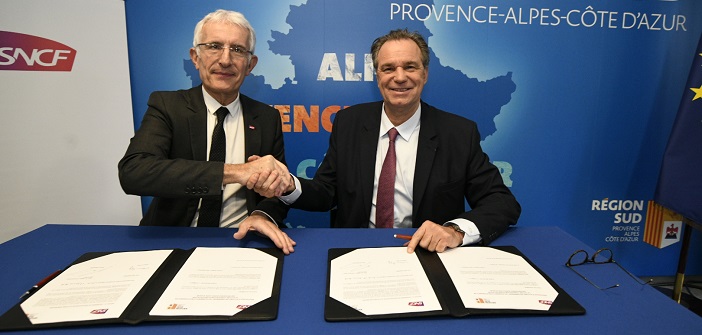After a long period of accusations of poor service and controversies that began following the election of the new regional majority in December 2015, it is now time for agreement and smiles!
After all, to sign a peace agreement, there must have been at least a small war (fortunately, the weapons were words that were plentiful in this matter… even if Christian Estrosi, during his presidency, made it a personal issue in relation to the SNCF president Guillaume Pepy).
Well, all that is behind us, and Renaud Muselier and Guillaume Pepy have signed the protocol of agreement for the future operating convention of the TER services of the South Region 2019-2023*, which sets the major priorities for a quality regional rail transport service for 100,000 daily customers.
Yesterday’s “enemies” are tomorrow’s allies
“I am pleased with the agreement we have reached with SNCF after several months of negotiation. This should further improve the offer and quality of service at the best price. This agreement is a significant advancement for the Region and the users of Provence-Alpes-Côte d’Azur,” said Renaud Muselier.
“I am delighted with this important agreement for SNCF. We are making strong and ambitious commitments in service of a strategic South Region for rail. These numerous commitments should better prepare us for facing the opening to competition,” declared Guillaume PEPY.
The Protocol of Agreement includes:
* An unprecedented effort on TER punctuality
Three points in punctuality were gained in 2018. SNCF commits to a significant effort to improve train punctuality from 82% to 90% by 2020 and to reduce the number of canceled trains to less than 1% for internal reasons. The agreement also includes penalties for not respecting schedules or train cleanliness, a bonus-malus of +/- 4 million euros related to punctuality and passenger information, and a depreciation system per canceled train.
* A new transport offer contributing to the development of the entire regional territory
The Region and SNCF embed the TER offer at the heart of the new ZOU! network to form its main framework, with three significant advancements:
- improvement of the offer with, notably by 2019, 4 trains per hour at peak times on the Cannes-Nice-Monaco, Marseille-Toulon, Marseille-Miramas routes, and from 2022 for Marseille-Aix-en-Provence,
-
acquisition of 5 new REGIOLIS trains that are more comfortable and efficient and an increase in train capacity,
-
maintaining all TER stations in the territory, as well as strengthening the coordination of TER with regional buses and urban networks.
* A significant increase in train ridership
Improving service quality, the redesign of the regional range in 2019, as well as the implementation of “multimodal passes” in 2020 in the Var and Alpes-Maritimes, following the one implemented by the Region with the Aix-Marseille-Provence Metropolis, will help to regain user confidence. The goal: increase traffic by about 10%.
* A new vision of station presence for better user service
A new service for assisting Passengers with Reduced Mobility, “ACCESS TER,” will be implemented starting in 2019. SNCF staff will be in direct contact with users, present in high-traffic stations to provide information, conduct ticket sales, or facilitate traveler access… Mobile teams will complement the system in at least thirty stations. Passenger buildings will be open during peak hours. Furthermore, SNCF will integrate from mid-2020 in its distribution networks at ticket counters or via digital tools, user information on the entire ZOU! network, as well as the sale of the corresponding tickets. Conversely, all TER tickets will be sold online from mid-2020 on the ZOU! e-boutique, which will be launched in 2019.
* A secure network where users travel with peace of mind
The efforts since 2016 by the Region to triple the railway police workforce are yielding results and will continue to ensure serene travel for users. SNCF teams aboard trains will be supplemented in sensitive areas (Marseille-Aix and Grasse-Cannes-Nice) by mediators. Efforts to combat fraud will be improved by combining Mobile Intervention Teams for filtering or onboard checks, line teams for checks on suburban trains, the systematic presence of a controller on long-distance journeys, and equipping 10 new stations with automated ticket control devices.
* A transparent and economical financial trajectory
The Region and SNCF have agreed on a financial trajectory enabled by SNCF’s industrial transformation, moving from a regional contribution of 276.75 million euros in operations in 2019 to 255 million euros (in constant euros) by 2023, a reduction of 22 million euros over 5 years while maintaining service quality. Simultaneously, the Region will take charge of an investment share of 104 million euros over the duration of the convention.
* Preparing for the opening to competition
The convention will provide a stable contractual framework allowing for the preparation for the opening to competition as provided by the law of public services TER. The procedure can be launched in 2020 for the conclusion of the first contracts in 2021 and the commencement of new rail services by late 2022. SNCF has indicated that it will indeed participate in these tenders.


